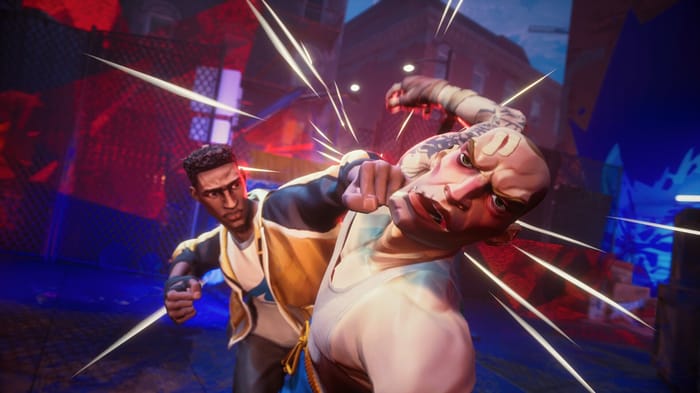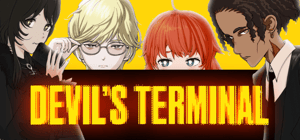Road to the IGF: Kinmoku's One Night Stand
One Night Stand's humanistic approach to storytelling earned developer Lucy Bundell an IGF nomination for Excellent in Narrative. Here's how it was made.

This interview is part of our Road to the IGF series. You can find the rest by clicking here.
One Night Stand is an intriguing interactive story that thrusts players into a "morning after" scenario and lets them decide how events unfold. Created by indie developer Kinmoku, a.k.a. veteran artist Lucy Blundell, the game made waves thanks to its decidedly human approach to storytelling.
Will you stay for the awkward morning coffee, escape as fast as you can, or perhaps even snoop around a stranger's room looking for clues? One Night Stand allows all that and more, letting you take the wheel and navigate through one of life's more awkward encounters time and time again.
Its uniquely intimate portrayal of human interaction earned Blundell an Independent Games Festival nomination for Excellence in Narrative. Keen to learn more, Gamasutra caught up with Blundell to chat about her writing style and game dev processes.
What's your background in making games?
I’ve been an artist ever since I was a child. I was always drawing comics, illustrating novels (even my school work), creating digital artwork, editing videos or building websites. I never imagined when I was younger I could make my own video game, so I aimed to become a comic artist, story-boarder or animator.
After graduating with a first in Animation, I sought-after a stable job rather than working independently. I worked as a junior 3D artist at Kisky Netmedia, making 3D models for an iPhone app, before landing a job at Chillingo, a subsidiary of Electronic Arts, as a graphic designer. I worked on over 200 mobile indie games; designing logos and icons, to giving art direction. After nearly five years, I decided to take the plunge and finally begin developing my own game.
One Night Stand is my first released game, however I’ve been working on other projects alongside it, which I hope to release soon.

How did you come up with the concept behind One Night Stand?
I was just on my way to the city center one weekend and a man sat opposite me on the tram looking hungover and ashamed. I initially jumped to the conclusion that he had a One Night Stand and thought that would make an interesting topic for a game since I’d never seen it done before. I figured there’d be plenty of different outcomes and thought it would make a quick, funny game that people would find enjoyable.
What development tools were used to build your game?
I used the free visual novel engine Ren'Py to build the game, which I highly recommend as it’s easy to learn and ports to almost anything! The rotoscope animations were originally filmed with my iPhone 5S, then drawn over in Toon Boom Studio. My background art was originally modeled and rendered in Blender, and the music was played with a guitar and computer keyboard and recorded using Garage Band.
How much time did you spend working on the game?
One Night Stand was originally made for Nanoreno game jam last March. I spent just under one month working on the jam version of the game, though it was rushed, buggy and incomplete.
The full version, with 12 endings, polished artwork, ending gallery, thorough bug testing etc. took me another five months. The full version initially released exclusively to Itch.io for two weeks on October 20, 2016, before releasing on Steam on November 7, 2016.
Could you talk about about your own personal creative process? How do you personally go about crafting a story?
I’m a bit of a messy developer if I’m honest. Artist first, developer second. I’m quite scatter-brained when I come up with ideas and randomly scribble down the best ones on post-it notes, which are, of course, scattered all over my desk as well.
I do try to plan as much as possible though. Initially, I'll come up with an idea and see if it's feasible, interesting and unique. I’ll then attempt to make a bare-bones script which I can later add further concepts and ideas that I have along the way. It's just sticking to this plan I sometimes find difficult. Usually, my basic script is still full of unnecessary scenes and characters, so I really have to make an effort and spend a lot of time boiling it down.

While writing the story I’ll draw character sketches and world/background concepts, so I can get a feel of the people and places where the story is based. I find drawing floor plans and maps pretty useful too, so I can imagine where the characters would be at certain points of the story. I think scene consistency is important, even in a visual novel game.
When I’m happy with the basic story, I’ll start to add it to the Ren’Py script, making smaller edits and adjustments along the way. I find my dialog gets more and more natural with each iteration, something I value a lot.
I then play the game over and over, to ensure each scene is how I intended it to be. Even when you think the script, code, UI etc are all good, sometimes they just don’t match the character’s mannerisms or appearance. I think this is an advantage of creating everything myself; I don’t upset anyone with constant changes and am able to quickly make them and move on.
The interactions in One Night Stand are strikingly human. How did you approach writing those characters, and imbuing them with a sense of honesty?
I wrote the characters in a way which felt natural to me; how I’d speak to people, or myself. I wanted the playable character to be clueless and slightly anxious, but otherwise a typical guy you can play however you want. For the woman, she was originally written to be a little more outgoing -- still introverted, but perhaps a little more cool than she eventually came across. The rotoscope animations changed her a lot, and made her more real in another. More like myself. I "acted" her, but really, I just spoke and reacted to several conversations in the way I always do. I’m not an actress!
It's the rotoscope animations that really make the interactions human, though. The woman's body language tells you much more than the words she says. Honesty and lying are very ingrained into One Night Stand's script, and there’s a lot of room for ambiguity or misjudgment.
One Night Stand has multiple endings, so how did you ensure every player choice led to a conclusion that felt natural?
Whilst writing and play-testing the game, I wondered "what if?" an awful lot. "What if he stole her panties?" or "What if he got her name wrong?". One Night Stand has so many endings because of these kind of thoughts. I didn't want to leave them out. After all, those actions might actually happen in that situation, you never know. Having all these endings makes the game a little bit more personal for each player playing, as they'll typically get a different one than someone else.

Along with my play-testers, seeing people play the game jam version on YouTube helped me understand how people liked to play as well. Some people liked to act honorably, where as others wanted to be more mean or cold towards her. A friend of mine said "I want to be able to piss her off!" and I replied "Yeah! I want to piss her off too!" so I went ahead and added it.
Adding the endings was a very natural process which came from observing all kinds of players, but I also, personally, love playing games that have satisfying conclusions based on how you played throughout.
Have you played any of the other IGF finalists? Any games you've particularly enjoyed?
I’ve played Overcooked, Virginia and, Stardew Valley, with the latter being my favorite game of 2016. It's such a sweet, happy game that I can sink hours into and feel like a carefree kid again. I love it. It's also wonderful to see Overcooked, a local co-op multiplayer game, as that's one of my favorite genres, and I often worry it's getting forgotten about. The fact it involves cooking is another big plus for me, as well.
I really want to play through more of the IGF finalists though, particularly Event[0], Lieve Oma, Orwell and Ladykiller. I just hope I get some free time, because the list is truly incredible.
What do you think are the biggest hurdles (and opportunities) for indie devs today?
The indie dev community continues to grow, but I believe the audience isn't. I think the real hurdle for indies is to show the rest of the world -- the non-gamers -- just how fun, entertaining or inspiring games can really be. Indies, especially, can take more risks and make games about pretty much anything, so I believe if there are more games about all kinds of crazy topics, they’ll start attracting larger and more diverse crowds.
About the Author
You May Also Like









